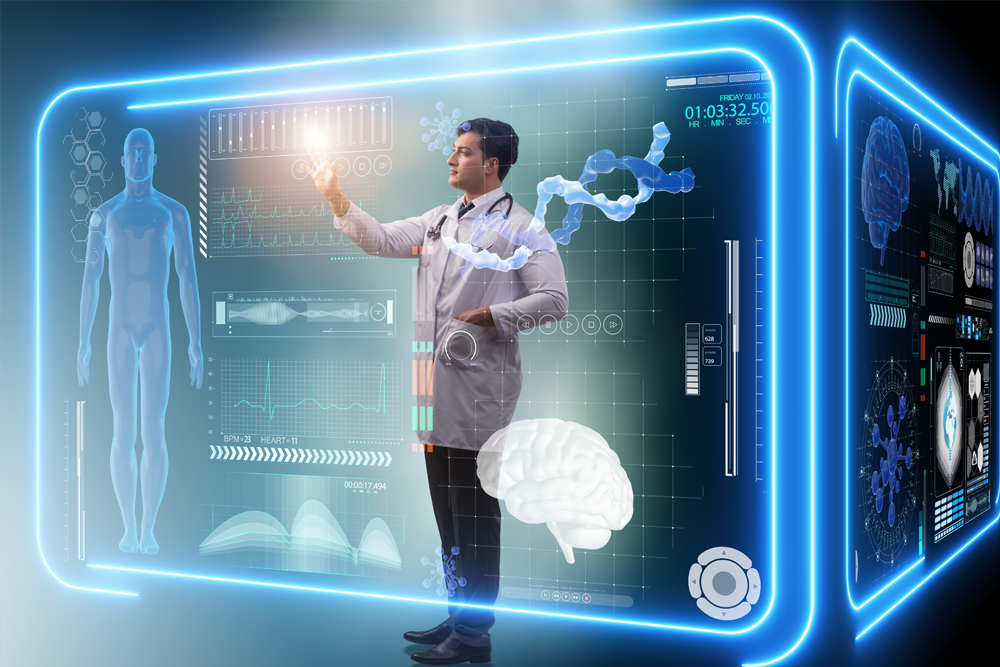How Is AI Used In Healthcare – 5 Powerful Real-World Examples That Show The Latest Advances
2 July 2021
When it comes to our health, especially in matters of life and death, the promise of artificial intelligence (AI) to improve outcomes is very intriguing. While there is still much to overcome to achieve AI-dependent health care, most notably data privacy concerns and fears of mismanaged care due to machine error and lack of human oversight, there is sufficient potential that governments, tech companies, and healthcare providers are willing to invest and test out AI-powered tools and solutions. Here are five of the AI advances in healthcare that appear to have the most potential.

1. AI-assisted robotic surgery
With an estimated value of $40 billion to healthcare, robots can analyze data from pre-op medical records to guide a surgeon’s instrument during surgery, which can lead to a 21% reduction in a patient’s hospital stay. Robot-assisted surgery is considered “minimally invasive” so patients won’t need to heal from large incisions. Via artificial intelligence, robots can use data from past operations to inform new surgical techniques. The positive results are indeed promising. One study that involved 379 orthopedic patients found that AI-assisted robotic procedure resulted in five times fewer complications compared to surgeons operating alone. A robot was used on an eye surgery for the first time, and the most advanced surgical robot, the Da Vinci allows doctors to perform complex procedures with greater control than conventional approaches. Heart surgeons are assisted Heartlander, a miniature robot, that enters a small incision on the chest to perform mapping and therapy over the surface of the heart.
2. Virtual nursing assistants
From interacting with patients to directing patients to the most effective care setting, virtual nursing assistants could save the healthcare industry $20 billion annually. Since virtual nurses are available 24/7, they can answer questions, monitor patients and provide quick answers. Most applications of virtual nursing assistants today allow for more regular communication between patients and care providers between office visits to prevent hospital readmission or unnecessary hospital visits. Care Angel’s virtual nurse assistant can even provide wellness checks through voice and AI.
3. Aid clinical judgment or diagnosis
Admittedly, using AI to diagnose patients is undoubtedly in its infancy, but there have been some exciting use cases. A Stanford University study tested an AI algorithm to detect skin cancers against dermatologists, and it performed at the level of the humans. A Danish AI software company tested its deep-learning program by having a computer eavesdrop while human dispatchers took emergency calls. The algorithm analyzed what a person says, the tone of voice and background noise and detected cardiac arrests with a 93% success rate compared to 73% for humans. Baidu Research recently announced that the results of early tests on its deep learning algorithm indicate that it can outperform humans when identifying breast cancer metastasis. Prime minister Theresa May announced an AI revolution would help the National Health Service (NHS), the UK’s healthcare system, predict those in an early stage of cancer to ultimately prevent thousands of cancer-related deaths by 2033. The algorithms will examine medical records, habits and genetic information pooled from health charities, the NHS and AI.
4. Workflow and administrative tasks
Another way AI can impact healthcare is to automate administrative tasks. It is expected that this could result in $18 billion in savings for the healthcare industry as machines can help doctors, nurses and other providers save time on tasks. Technology such as voice-to-text transcriptions could help order tests, prescribe medications and write chart notes. One example of using AI to support admin tasks is a partnership between the Cleveland Clinic and IBM that uses IBM’s Watson to mine big data and help physicians provide a personalized and more efficient treatment experience. One way Watson supports physicians is being able to analyze thousands of medical papers using natural language processing to inform treatment plans.
5. Image analysis
Currently, image analysis is very time consuming for human providers, but an MIT-led research team developed a machine-learning algorithm that can analyze 3D scans up to 1,000 times faster than what is possible today. This near real-time assessment can provide critical input for surgeons who are operating. It is also hoped that AI can help to improve the next generation of radiology tools that don’t rely on tissue samples. Additionally, AI image analysis could support remote areas that don’t have easy access to healthcare providers and even make telemedicine more effective as patients can use their camera phones to send in pics of rashes, cuts or bruises to determine what care is necessary.
In the very complex world of healthcare, AI tools can support human providers to provide faster service, diagnose issues and analyze data to identify trends or genetic information that would predispose someone to a particular disease. When saving minutes can mean saving lives, AI and machine learning can be transformative not only for healthcare but for every single patient.
Related Articles
Bridging The AI Divide: Why Europe’s AI Future Depends On Transformative Innovation
By now, “smart” versions exist of just about every home appliance, gadget and gizmos we can think of. However, manufacturers continue[...]
Forget ChatGPT: Why AI Agents Are The Real Game-Changer For Financial Services
By now, “smart” versions exist of just about every home appliance, gadget and gizmos we can think of. However, manufacturers continue[...]
Agentic AI Enters Management: Taco Bell’s Byte-Sized Approach To Virtual Restaurant Leadership
By now, “smart” versions exist of just about every home appliance, gadget and gizmos we can think of. However, manufacturers continue[...]
Beyond ChatGPT: The 5 Toughest Challenges On The Path To AGI
By now, “smart” versions exist of just about every home appliance, gadget and gizmos we can think of. However, manufacturers continue[...]
The AI Leadership Crisis: Why Chief AI Officers Are Failing (And How To Fix It)
By now, “smart” versions exist of just about every home appliance, gadget and gizmos we can think of. However, manufacturers continue[...]
15 Mind-Blowing AI Statistics Everyone Must Know About Now
By now, “smart” versions exist of just about every home appliance, gadget and gizmos we can think of. However, manufacturers continue[...]
Sign up to Stay in Touch!
Bernard Marr is a world-renowned futurist, influencer and thought leader in the fields of business and technology, with a passion for using technology for the good of humanity.
He is a best-selling author of over 20 books, writes a regular column for Forbes and advises and coaches many of the world’s best-known organisations.
He has a combined following of 4 million people across his social media channels and newsletters and was ranked by LinkedIn as one of the top 5 business influencers in the world.
Bernard’s latest book is ‘Generative AI in Practice’.










Social Media